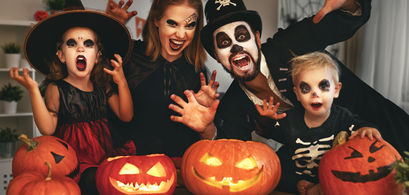Are you ready for a scare? Halloween is just around the corner, but gone are the days when a bin bag and a set of plastic vampire teeth would suffice as a costume. In 2023, spooky spending is projected to reach over one billion British pounds: a significant jump on the previous year. Halloween has always been a big deal in the United States, but with UK Halloween spending sky-rocketing by 342% over the last decade, is fright night now the fastest growing holiday on this side of the pond too? Moneyzine investigates…
Halloween Spending Has Increased 342% over the Last Decade
The British public spent a whopping £687 million on Halloween decorations, confectionery, clothing and food last year. But this figure is projected to increase still further, to a staggering £1.07 billion in 2023: a jump 55.9%.
While the sharp upward trend in spending may be staggering, it isn’t unique to the UK, as American consumers are also projected to spend more on Halloween this year. With an astonishing 154 million Americans planning to carve pumpkins this year, the National Retail Foundation is anticipating that spending for spooky season in the US will hit a record $12.2 billion, or $110 per person. While this number exceeds last year’s total of $10.6 billion by a respectable margin, the percentage increase (just 14%) is rather staid in comparison to Britain’s.
Ten years’ ago in 2013, when consumers were clamouring to dress up as Miley Cyrus and Walter White, Halloween spending in the United Kingdom stood at just £230 million. This number has grown by £787 million since then, with an average year-on-year increase of £78.7 million. A decade later, with Barbie and Wednesday Addams topping the costume charts, spending is set to exceed the billion-pound mark. It’s a trend that not even experts saw coming, with earlier estimates projecting a far more modest £777 million. Yet now Brits are expected to rack up £28.95 million on Halloween pumpkins alone…
So why are consumers prepared to spend so much on Halloween? The answer could perhaps lie in witchcraft, or, to put it another way, the practice of rituals – at least this is the theory put forward by Stacy Wood, a professor of Marketing at North Carolina State University’s Poole College of Management. One of the key aspects of a ritual is possession of the artefacts that accompany it ritual, and in October that means costumes, candy and pumpkins.
Easter Spending Hasn’t Bounced Back
It is interesting to compare the now popular holiday with Easter, which boasts its own artefacts of bunnies, chocolate eggs and hot cross buns. But in the United Kingdom, at least, Easter spending just hasn’t picked up in the same way as it has for its ghoulish counterpart.
Despite the fact that Brits spent an estimated £415 million on Easter eggs in 2023, an overall estimated spend of £960 million over Easter 2023, averaging out at just £28.61 per person, is likely to put the holiday firmly behind Halloween if this year’s projections are right. In more bad news for Easter-enthusiasts, this year’s statistics represent a real-terms decline on 2022, because while there was a 7% increase on the £900 million spent in 2022, after inflation and an overall decrease in sales volume is taken into account, the true picture is of a 3% decline in spending.
Back in April 2023, 45% of respondents in a survey by TopCashback said that their Easter celebrations had been impacted by the cost of living crisis, and for many the once popular holiday was seen as expendable, with 36% stating that they wouldn’t be celebrating at all. It is perhaps no surprise that Easter is no longer enjoying the heyday that it saw in 2019, when expenditure was at its all-time high of £1.1 billion.
That said, the cost of living crisis doesn’t seem to have impacted Halloween spending in the same way: indeed quite the opposite. The sharp increase in spending has been put down to a generational shift in consumer demographics. In 2013, when the data started, the last year of Millennials were not yet adults and the youngest members of Generation Z were just a year old.
Now, Generation Z is by far the biggest customer cohort when it comes to fright night, with 87% planning to spend at least £46 each on celebrations, decorations and costumes.
Brits Cutting Back on Christmas Spending
A recent report from PwC shows that almost one in three adults is planning to cut back on Christmas spending amidst the cost of living crisis, with 80% citing increased food and energy costs as the main reason, and 20% pointing to increased mortgage or rent payments.
UK retail sales are forecast to total £84.9 billion over the six week Christmas period, which equates to a year-on-year increase of 3.3%. However, and as is the case with the Easter figures, this apparently rosy figure does not factor in the effect of inflation, which currently stands at 6.7%. Once this is taken into account the true picture emerges, suggesting that households are in fact reducing their real-terms Christmas spending this year. This follows a similar trend to 2022, when the year-on-year increase was negative 3.0%.
Christmas Spending | Halloween Spending | |
|---|---|---|
2022 | £82,200,000,000.00 | £687,000,000.00 |
2023 | £84,900,000,000.00 | £1,071,000,000.00 |
Increase in % | 3.3% | 55.9% |
With each household projected to spend £823 on Christmas, covering everything from gifts to Christmas parties, it is believed that the biggest cut-backs will be on decorations, which are seen as less essential to the festive experience, so perhaps Stacy Wood’s theory about ritual artefacts does not hold the answers.
Jonathan Merry, personal finance expert at Moneyzine, has his own theory about why Halloween may be overtaking Christmas and Easter to become our holiday of choice:
With the cost of living crisis looming over everything we do, the traditional markers of adulthood have become less well-defined and less attainable. Unlike Christmas, which can often be seen as stressful, with family obligations and mounting expenses to contend with, Halloween is more subversive and offers opportunities for costumes, silliness and scares – in essence, a form of escapism not offered by any other holiday seasonJonathan Merry, personal finance expert at Moneyzine
Contributors





